7 Major Players In Free Online Education

Python Programming Language – Official Website
Computer Networking : Principles, Protocols and Practice | INL: IP Networking Lab
Computer Networking : Principles, Protocols and Practice (aka CNP3) is an ongoing effort to develop an open-source networking textbook that could be used for an in-depth undergraduate or graduate networking courses. The first edition of the textbook used the top-down approach initially proposed by Jim Kurose and Keith Ross for their Computer Networks textbook published by Addison Wesley. CNP3 is distributed under a creative commons license. The second edition of the ebook is now divided in two main parts The first part of the ebook uses a bottom-up approach and focuses on the principles of the computer networks without entering into protocol and practical details. Numerous exercises are also provided as well as interactive quizzes that enable the students to verify their understanding of the different chapters and lab experiments with netkit and other software tools. First edition of the textbook The book contains the following chapters : Bibliography Slides Discussion groups Contributors
How to Think Like a Computer Scientist — How to Think like a Computer Scientist: Interactive Edition
This interactive book is a product of the Runestone Interactive Project at Luther College, led by Brad Miller and David Ranum. There have been many contributors to the project. Our thanks especially to the following: This book is based on the Original work by: Jeffrey Elkner, Allen B. The Runestone Interactive tools are open source and we encourage you to contact us, or grab a copy from GitHub if you would like to use them to write your own resources.
Learn Python - Free Interactive Python Tutorial
s Python Class - Educational Materials
Welcome to Google's Python Class -- this is a free class for people with a little bit of programming experience who want to learn Python. The class includes written materials, lecture videos, and lots of code exercises to practice Python coding. These materials are used within Google to introduce Python to people who have just a little programming experience. The first exercises work on basic Python concepts like strings and lists, building up to the later exercises which are full programs dealing with text files, processes, and http connections. To get started, the Python sections are linked at the left -- Python Set Up to get Python installed on your machine, Python Introduction for an introduction to the language, and then Python Strings starts the coding material, leading to the first exercise. This material was created by Nick Parlante working in the engEDU group at Google. Tip: Check out the Python Google Code University Forum to ask and answer questions.
Python Ecosystem - An Introduction » mirnazim.org
When developers shift from PHP, Ruby or any other platform to Python, the very first road block they face (most often) is a lack of an overall understanding of the Python ecosystem. Developers often yearn for a tutorial or resource that explains how to accomplish most tasks in a more or less standard way. What follows is an extract from the internal wiki at my workplace, which documents the basics of the Python ecosystem for web application development for our interns, trainees and experienced developers who shift to Python from other platforms. This is not a complete resource. My target is to make it a work in perpetual progress. Intended Audience This is not about teaching Python - the programming language. I am assuming you are working on Linux (preferably Ubuntu/Debian) or a Linux-like operating system. Search the web for the best possible ways of installing Python on your operating system. The version confusion TL;DR: Python 2.x is the status quo; Python 3 is the shiny new thing.
Tutorial - Learn Python in 10 minutes
NOTE: If you would like some Python development done, my company, Stochastic Technologies, is available for consulting. This tutorial is available as a short ebook. The e-book features extra content from follow-up posts on various Python best practices, all in a convenient, self-contained format. All future updates are free for people who purchase it. Preliminary fluff So, you want to learn the Python programming language but can't find a concise and yet full-featured tutorial. Properties Python is strongly typed (i.e. types are enforced), dynamically, implicitly typed (i.e. you don't have to declare variables), case sensitive (i.e. var and VAR are two different variables) and object-oriented (i.e. everything is an object). Getting help Help in Python is always available right in the interpreter. >>> help(5)Help on int object:(etc etc) >>> dir(5)['__abs__', '__add__', ...] >>> abs. Syntax Python has no mandatory statement termination characters and blocks are specified by indentation. Strings
Related:



